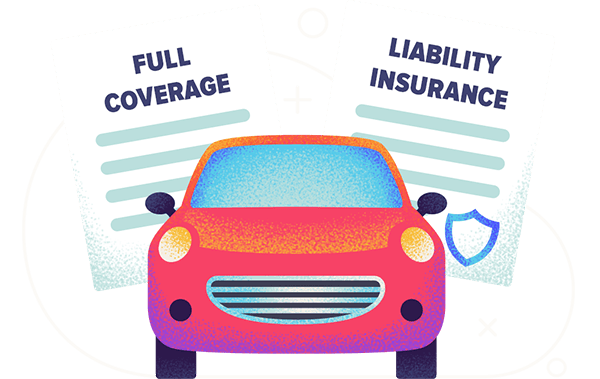Navigating the complexities of insurance coverage can be daunting, especially when deciding between full coverage and liability-only options. Let's break down the differences and help you determine which one suits your needs best.
Full Coverage Insurance:
Full coverage insurance typically includes both liability and comprehensive/collision coverage. It protects you financially in various scenarios, including accidents, theft, vandalism, and natural disasters. While comprehensive, it often comes with a higher premium due to the broader protection it offers.
Liability Only Coverage:
Liability-only insurance covers damages and injuries you cause to others in an accident. It does not cover your vehicle's damages or injuries to you or your passengers. It's often a more affordable option but leaves you vulnerable to out-of-pocket expenses in case of accidents or other incidents affecting your vehicle.
Which Option Is Best for You?
Consider Your Vehicle's Value: If you have a newer or more valuable car, full coverage may provide peace of mind against potential financial losses.
Evaluate Your Budget: If you're on a tight budget and have an older vehicle with lower value, liability-only coverage might suffice, helping you save on premiums.
Assess Your Risk Tolerance: Full coverage offers comprehensive protection, while liability-only coverage means taking on more risk. Consider your comfort level with potential financial liabilities in the event of an accident.
State Requirements: Some states have minimum insurance requirements that may influence your decision. Make sure you comply with legal mandates while considering your coverage options.
Final Thoughts:
Choosing between full coverage and liability-only insurance depends on your individual circumstances, budget, and risk tolerance. Understanding the differences empowers you to make informed decisions about protecting your assets and finances.
If you have questions about insurance or need assistance securing the right coverage for your needs, don't hesitate to reach out. Contact us through the form on our website, and our team will be happy to assist you in finding the best insurance solution tailored to your requirements.
Navigating the complexities of insurance coverage can be daunting, especially when deciding between full coverage and liability-only options. Let's break down the differences and help you determine which one suits your needs best.
Full Coverage Insurance:
Full coverage insurance typically includes both liability and comprehensive/collision coverage. It protects you financially in various scenarios, including accidents, theft, vandalism, and natural disasters. While comprehensive, it often comes with a higher premium due to the broader protection it offers.
Liability Only Coverage:
Liability-only insurance covers damages and injuries you cause to others in an accident. It does not cover your vehicle's damages or injuries to you or your passengers. It's often a more affordable option but leaves you vulnerable to out-of-pocket expenses in case of accidents or other incidents affecting your vehicle.
Which Option Is Best for You?
Consider Your Vehicle's Value: If you have a newer or more valuable car, full coverage may provide peace of mind against potential financial losses.
Evaluate Your Budget: If you're on a tight budget and have an older vehicle with lower value, liability-only coverage might suffice, helping you save on premiums.
Assess Your Risk Tolerance: Full coverage offers comprehensive protection, while liability-only coverage means taking on more risk. Consider your comfort level with potential financial liabilities in the event of an accident.
State Requirements: Some states have minimum insurance requirements that may influence your decision. Make sure you comply with legal mandates while considering your coverage options.
Final Thoughts:
Choosing between full coverage and liability-only insurance depends on your individual circumstances, budget, and risk tolerance. Understanding the differences empowers you to make informed decisions about protecting your assets and finances.
If you have questions about insurance or need assistance securing the right coverage for your needs, don't hesitate to reach out. Contact us through the form on our website, and our team will be happy to assist you in finding the best insurance solution tailored to your requirements.
Navigating the complexities of insurance coverage can be daunting, especially when deciding between full coverage and liability-only options. Let's break down the differences and help you determine which one suits your needs best.
Full Coverage Insurance:
Full coverage insurance typically includes both liability and comprehensive/collision coverage. It protects you financially in various scenarios, including accidents, theft, vandalism, and natural disasters. While comprehensive, it often comes with a higher premium due to the broader protection it offers.
Liability Only Coverage:
Liability-only insurance covers damages and injuries you cause to others in an accident. It does not cover your vehicle's damages or injuries to you or your passengers. It's often a more affordable option but leaves you vulnerable to out-of-pocket expenses in case of accidents or other incidents affecting your vehicle.
Which Option Is Best for You?
Consider Your Vehicle's Value: If you have a newer or more valuable car, full coverage may provide peace of mind against potential financial losses.
Evaluate Your Budget: If you're on a tight budget and have an older vehicle with lower value, liability-only coverage might suffice, helping you save on premiums.
Assess Your Risk Tolerance: Full coverage offers comprehensive protection, while liability-only coverage means taking on more risk. Consider your comfort level with potential financial liabilities in the event of an accident.
State Requirements: Some states have minimum insurance requirements that may influence your decision. Make sure you comply with legal mandates while considering your coverage options.
Final Thoughts:
Choosing between full coverage and liability-only insurance depends on your individual circumstances, budget, and risk tolerance. Understanding the differences empowers you to make informed decisions about protecting your assets and finances.
If you have questions about insurance or need assistance securing the right coverage for your needs, don't hesitate to reach out. Contact us through the form on our website, and our team will be happy to assist you in finding the best insurance solution tailored to your requirements.


